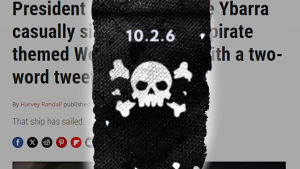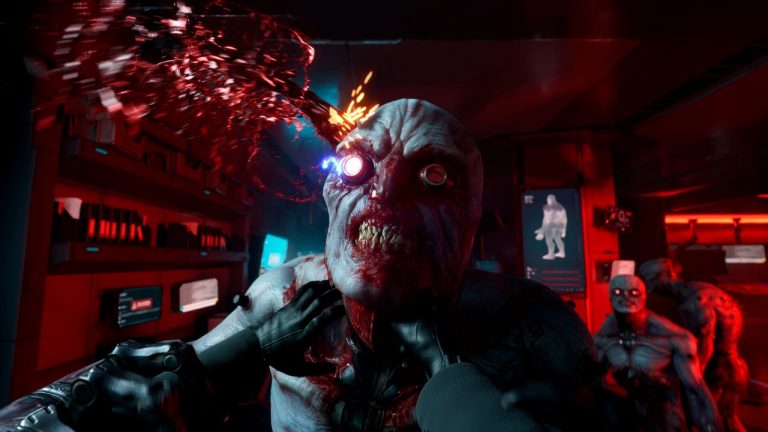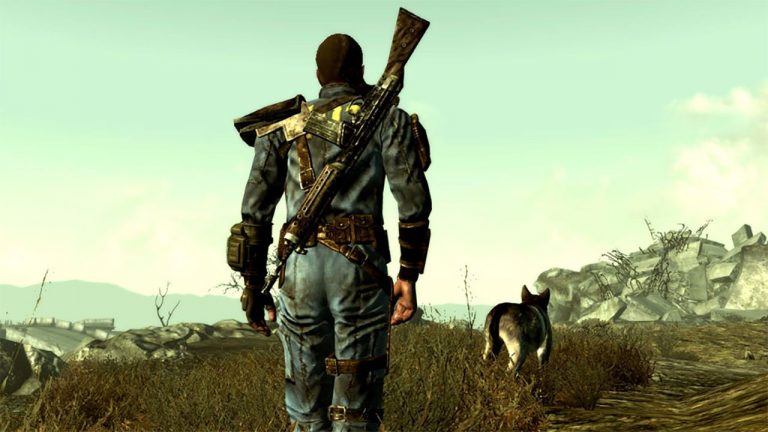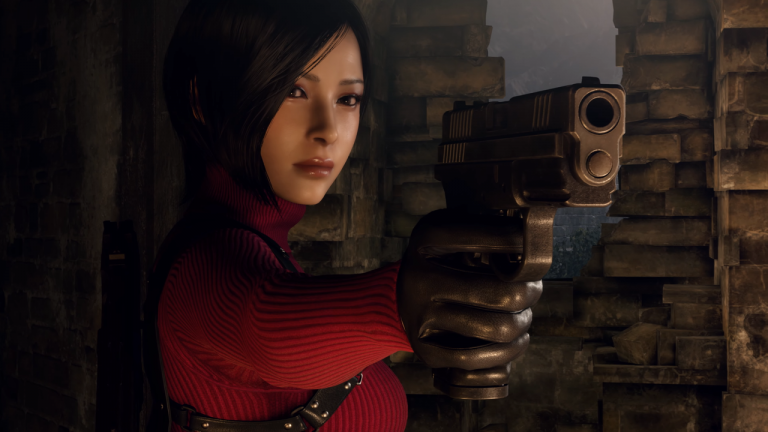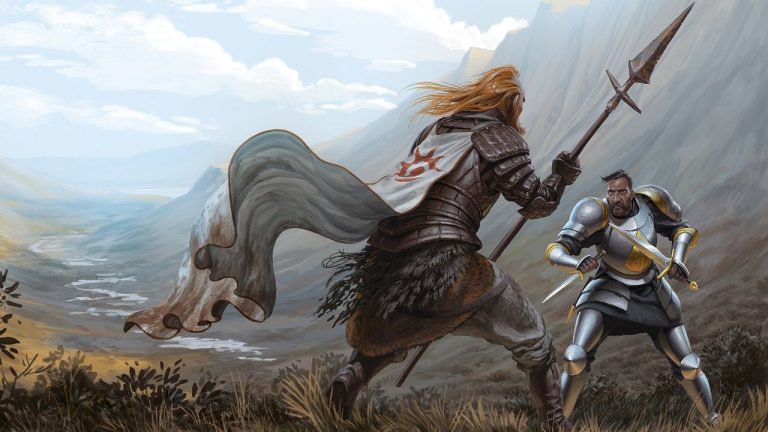This diary first appeared in PC Gamer magazine issue 389 in October 2023. We do one every month, taking on new challenges and approaching our favourite games from entirely new angles—and letting you know how we got on.
I’ve decided I no longer want to be a hero. Through a lifetime spent playing games I’ve amassed a swollen backlog of tedious do-gooders. And, at the same time, there’s nothing attractive about being nakedly evil: it’s vulgar, unfulfilling, and usually quite stressful. Thankfully, the complexity of Baldur’s Gate III offers richer possibilities. In an act of pure arrogance, I decide to cast a protagonist in my own mould, with all the same distracting inadequacies. He’ll be an inveterate coward who is somehow a people-pleaser, and grotesquely self absorbed at the same time. He’ll agree to anything to make himself look dashing, then go to despicable lengths to avoid actually doing it.
It’s important he looks right. In the end, I settle on the combined qualities of Lord Farquaad from Shrek, Humperdinck from the Princess Bride, and a barista who sighs when you order a chai latte. I think about giving him an honorary title, which he neither earned nor inherited. This is based on a story I once read about a druid who tricked out his pet with deception skills and tuxedo then renamed him Sir Bearington. I realise, however, that I don’t know enough about D&D lore to pick an appropriate honorific. Instead I call him Pillius Flenk; a name that sounds partly like something your dad would call you for shining the torch in the wrong direction while he’s drilling, and partly like a type of parasite. Pillius Flenk is the sort of man who agrees to play at your wedding then reveals on the day that he only does acoustic covers of Insane Clown Posse songs. He is, magnificently, a bard.
The Journey Begins
(Image credit: Larian Studios)
Pillius’ journey begins at the start of Baldur’s Gate III. If you’ve tried it, you’ll know that it takes a while to get going. There’s a lot of nautiloid before you get to the nice. At first I plan on scurrying through the opening as fast as possible, but I realise it’s an excellent opportunity to learn who Pillius truly is. Unlike me, he’s useful: stealthy, charming, and deft. I decide that these skills, however, can only be used in the pursuit of self-preservation or braggadocio. Anything approaching genuine heroism counts should be considered a personal failure.
My first challenge comes when I meet the chipper brain monster in the opening moments of the game. I have no desire to save it. And it could eventually be a danger to me. But it appears to be a sentient creature. At least, it’s sentient enough for Pillius to crave its approval. Flenk’s nimble fingers come in handy when prizing said brain out of a mutilated skull, and I have my first of many adoring party members.
It soon gets more complicated. We meet Lae’zel, a furious githyanki fighter with whom Flenk teams up, more out of a sense of self-preservation than anything else. If the monsters are busy fighting her, it leaves more time for Pillius to lurk at the back, hurling insults and playing his lyre. It’s around now that I decide what kind of fighter Flenk is. Yes, he carries a rapier, but this is because a) it looks dashing and b) so he can jab anyone who gets too close to him. I decide that sprinting into close combat will always be against the rules. Instead, Flenk’s approach to fighting involves being as far away from danger as possible, while still close enough to hurl withering insults at his enemies. Lae’zel might soften up foes with her sword, but it’s Flenk calling them a “threadbare chimp-lackey” that finishes them off. He’s the RPG equivalent of the small, insulting kid at school who mocks you while hiding behind his massive cousin.
Flayer cake
(Image credit: Larian Studios)
Another dilemma quickly presents itself. Does our party risk potential death saving Shadowheart from her pod? The answer is yes, but only because she’s awake and talking, and therefore capable of judging Flenk for abandoning her. If she was unconscious, Pillius would have strutted straight past without a second thought. It does raise another interesting RP question: is saving her worth annoying Lae’zel? The answer is yes, again, because looking heroic is more important than avoiding interpersonal conflict. We’re learning who Flenk is together. There’s also something quite satisfying about choosing the most conniving way to resolve every conflict. Some might call it diplomacy. Others, manipulation. Either way, the opening ends with Flenk creeping to the nautiloid console while his colleagues do all the fighting, after one spectacularly ill-timed rendition of The Power. I can’t be sure, but I think I saw the mind flayer dancing.
A bigger party also means more people to impress, which is ideal.
Flenk’s first act after escaping the crashing ship is to try and steal the mysterious artefact from Shadowheart. Not because he’s a thief, you understand, but more because she didn’t want him to have it. It’s more alarming proof that the worst thing you can be in the company of Pillius Flenk is asleep. Soon after that, I pull a roguish wizard, Gale, from a rock. Flenk lies to him, quite obviously and pointlessly, about landing the nautiloid and saving the day. I decide that Flenk likes Gale. He’s more fun than Shadowheart, with a similar line in garrulous bollocks. A bigger party also means more people to impress, which is ideal.
Flenk gets his first opportunity when we stumble across some ruffians guarding an abandoned chapel. I have no real compulsion to get inside but, during a normal playthrough, the very fact someone blocked my way would be reason enough to fight them. But I have to remind myself that Flenk will always take the path least likely to cause physical harm. This results in gloriously cheesy one-two in which Flenk convinces the guards that the nautiloid ship is an invasion force. They flee, then he uses his theatrical skills to fool another bandit into letting us inside. Part of me is delighted that Pillius used his skills to avoid a fight, and in doing so managed to impress Gale and Shadowheart. But I’m also worried that it was slightly too slick. A terrifying thought grips me: what if Flenk is actually good? There’s a danger of him turning into a charming pacifist. If this was a movie, this would be the first nascent spark of humanity in Pillius. I feel like I need to mislead someone, and quickly. The game also rewards his nonsense: talking my way past the bandits aligns with Pillius’ background as a Charlatan, and he feels Inspired, which is like rewarding a dog for pissing on your sofa.
Lich pickings
(Image credit: Larian Studios)
It’s impossible to navigate the chapel without some fighting, and at times combat is perilous enough that I wish I’d taken more time to find a fourth party member before entering, if only to have someone else to hide behind. Eventually, however, through a mix of hurling insults, magical laughter and playing inappropriate songs every time I have an action left over, we succeed. Best of all, Flenk finds an amulet that lets me talk to dead people, which offers vastly increased scope for impressing strangers, even if they are already dead.
Druid Grove
(Image credit: Larian)
We reach the first big location, Druid Grove, and the game opens up in a way that’s almost intimidating. For a man whose primary purpose in life is making sure everyone is deeply impressed with him, this is a problem. Most peoples’ goals here don’t align. Flenk starts with the simple stuff, filling him with the false confidence that he can be everyone’s friend. He lies to some children and tells them they’ll be great at fighting, when in truth they have as much chance of survival as the last Garibaldi in an old people’s home. And, yet again, we learn that Pillius’ propensity of nonsense can be beneficial. This conversation leads us to recruiting Wyll, who I would otherwise almost certainly have missed. Flenk decides he doesn’t especially like Wyll, because he uses his rapier with irritating elan, when actually it should only be used for desperately discouraging enemies who get too close to you. There are some more pleasing distractions in the camp—Flenk uses his sleight of hand skills to steal a ring from a thieving Tiefl ing child—then we’re faced with a SONGS IN THE KEY OF STRIFE Pillius Flenk has a tune for every occasion genuine moral dilemma.
Flenk uses all his bard powers to ingratiate himself to them.
As Pillius struts to the ritual site, he comes across a group of people arguing with the druids. Their young daughter, Arabella, attempted to steal a sacred idol and has been taken prisoner as punishment. This is an interesting proposition. Saving a doomed child would be an amazingly heroic thing to do. But there’s a worrying chance that it’ll actually involve fighting people who can turn into bears, which absolutely isn’t Flenk’s vibe. Nevertheless, armed with capable friends and a pathological desire to be loved, Pillius enters the druids’ nucleus. Most of them seem rather reasonable. There are some fellow thespians inside: Alfira, a tiefling bard, whom I desperately want to belittle but can’t resist helping; and Volo, a flamboyant storyteller who’s like looking in a bullshit mirror. Flenk uses all his bard powers to ingratiate himself to them both. I hope that we’ll meet again later, assuming the druids don’t kill us all.
The party meets Kagha, a fearsome druid leader who feels like Evanagline Lilly playing Margaret Thatcher. I don’t know whether to attack her on sight or fall in love. In true Baldur’s Gate style, Kagha is complex rather than outright evil, with her own specific motivations. At first, Flenk’s job is simple: stop Kagha from menacing a tiny child. My path is clear. Using Flenk’s apparently comprehensive bardic knowledge, I quote Silvanus and convince Kagha to free the child. But it leads to a bigger dilemma. She intends to conduct a ritual that will wrap the grove in brambles, sealing the druids inside but killing the refugees that surround it. Flenk isn’t morally prepared for this sort of decision. Saving the refugees would be the most heroic choice, but it’s obviously rather dangerous. And killing Kagha doesn’t seem like an option, either. We nearly lost a fight earlier against some reanimated writers—the weakest of all enemies—so it’s unlikely we’d fare well against an enclave of literal bears. Thankfully, a third option presents itself. Kagha is only acting as the druids’ leader because Halsin, their actual boss, has been imprisoned by goblins. So, at the risk of ending this diary like Fellowship of the Ring, Pillius Flenk’s mission is clear. He will go to the goblin camp and rescue Halsin. Halsin will tell Kagha to stop being an ass. And the refugees will (probably) be saved. Once again, the more I get to know Pillius Flenk, the more creeping danger there is of him becoming good. But Baldur’s Gate III is rich enough that there’s every chance he’ll do something awful instead.
The Cave
(Image credit: Larian Studios)
It isn’t long before we chance upon our foes. The team enter a goblin cave and hear them talking about torturing a druid. We tread carefully; this must be the place. Flenk sneaks ahead heroically, if such a concept isn’t oxymoronic, and seizes his chance. A life of secret cowardice has prepared Flenk for this. While his companions aren’t looking, he turns himself invisible and shoves the goblin guard over a ledge to his death. It’s the kind of battle Pillius was born for; one that’s over before his opponents even realise they’re being attacked. The goblin’s associates join the battle, but Flenk has gone to the back of the pack for another rendition of The Queen’s High Seas. Suspiciously, the fight ends quickly.
It turns out this is because this isn’t the stronghold at all, merely a cave with some goblins in it. The true task It turns out this is because this isn’t the stronghold at all, merely a cave with some goblins in it. The true task lies further ahead, and it promises to be significantly more challenging. We sneak into a town watched by a goblin vanguard, and Flenk climbs a ladder, ready to implement ‘shove and flee: part 2’. Somewhat unexpectedly, though, he ends up in a conversation with his quarry. It’s here that Flenk has his first taste of his Illithid powers, which allow him to mentally dominate weak-minded adversaries. It’s exceedingly useful, but I also don’t want to become reliant upon it. Yes, Flenk will do anything to avoid a fight. But a true bard doesn’t require the edge offered by infernal powers; instead they succeed through the power of poetry, performance, and pushing people off ledges when they’re not looking. There are some depths, apparently, that even a rogue like Pillius Flenk won’t plumb.
Whatever the method, deception turns out to be something Flenk is genuinely brilliant at. It’s quite satisfying avoiding fights, and it’s something my ragtag associates seem to admire. Shadowheart and Gale because they seem decent, and Astarion because he too likes the smell of his own bullshit. This in itself feels like a very Pillius Flenk situation. Yes, my party composition could be better. But all that matters is being surrounded by people who’ll constantly heap praise on their flamboyant party leader, and Flenk’s current teammates seem to celebrate his charming cowardice.
That’s your clot
(Image credit: Larian Studios)
Our party dynamic isn’t without its problems. One night, Flenk awakes to find Astarion bearing down on him like a plump pug atop half a sausage roll. Pillius is shocked to learn that his fellow rogue is a vampire, desperate for blood. After some discussion, Flenk decides to let him have a few gulps of the bard stuff, partly to improve his mood and fighting abilities, and partly because Flenk is such a despicable people pleaser he’ll literally let another man drain his vital essences. I even feel slightly rude using a persuasion test to stop Astarion from draining him dry. And, sure enough, the next day Flenk is afflicted with the Bloodless debuff, as a constant and humiliating reminder of his acquiescence. Still, at least Astarion seems chipper.
Flenk awakes to find Astarion bearing down on him like a plump pug atop half a sausage roll.
On a related note, the tactic of shameless appeasement is working so far. We haven’t had to fight anyone. Our team discovers some goblins torturing a gnome tied to a windmill. Flenk normally wouldn’t intervene, but, swollen with self-confidence, he charms his way to saving the gnome, in an almost vulgar display of his coercive power. These actions also ingratiate him to Shadowheart; something which is gradually creeping up his priority list.
The Goblin Camp
(Image credit: Larian Studios)
We reach the goblin outpost, and Flenk yet again charms his way past the sentries. This time, however, there’s a snag. While dealing with a faecally-fixated sentinel called Olak, Pillius is faced with a miserable conundrum: fight his way into the compound or smear literal shit all over his face. This is obviously a cruel hazing ritual, like plumbers telling the work experience boy to ask for fallopian tubing at the hardware store. In any other playthrough I’d fling the faeces back in Olak’s face and fight my way through, dignity intact. But that’s not how Pillius Flenk rolls. Faced with no other option, our gallant hero takes the bold choice of rubbing worg dung into his magnificent countenance. As anyone who’s experienced it will tell you, it’s incredibly difficult to get excrement out of lustrous facial hair. Worse still, the humiliation extends to my character’s appearance, meaning that Flenk appears in every cutscene with a face like he’s been bobbing for sweetcorn at a sewage farm. Asterion understandably, disapproves. Hopefully it has quenched his thirst.
Our gallant hero takes the bold choice of rubbing worg dung into his magnificent countenance.
As disgusting as this obviously is, it does mean that we’ve progressed into the goblin camp without conflict. Upon our arrival, we’re met by something that chills Flenk to the marrow: his not-as-talented bard associate, Volo, is being held captive by the goblins and forced to perform. The goblins obviously see him as some sort of theatrical novelty, with his new owner, Gribbo, referring to him as a “pigeon”. Displaying any sort of theatrical acumen here would be to risk the same fate as poor Volo. And yet, Flenk cannot resist. Performance is everything, and he must captivate his public, however repellent and tasteless they may be. And so, caked in shit, Flenk proceeds to have an epic rap shat-battle with Volo. Pillius’ rhymes are so fearsome it actually ends up breaking the other bard, and Gribbo sends him back to his cage in disgrace. I’m sure this will lead to something fortuitous eventually, because that’s how Baldur’s Gate tends to work. But right now all Flenk cares about is proving himself to be the more talented wordsmith.
The Shattered Sanctum
(Image credit: Larian Studios)
We enter the Shattered Sanctum, a ravaged underground temple that the goblins have occupied. It’s a complete hovel. There are torture racks, wicked ceremonies, and caged captives everywhere. It’s also crammed with potential enemies who, thankfully, aren’t currently interested in fighting us. After some time spent exploring I discover that Halsin is being held, in bear form, in the worg pens. Nothing about this sounds ideal. That’s a lot of feral animals, none of which can be lulled into submission by a lilting tune or cunningly observed rhyming couplet. Flenk tries to charm his way past the guards by discussing our shared love of throwing sharp stones at bears, but this just enrages Halsin, who bursts out of his pen and attacks. Happily, he’s on my side. It’s far more like an actual fight than I’d like, but the goblins go down without too much resistance, and we heroically kill the ones fleeing to raise the alarm. Halsin is free, and nobody who matters is dead. Now all we need to do is sneak back to the enclave. Right?
Wrong. Halsin wants Flenk to kill all the goblin leaders before he’ll leave. Now, Flenk isn’t an expert at murder, but he does know it’s quite difficult to kill people without some small amount of fighting. Worse still, it’s pretty obvious that anyone in charge of an army of goblins is a) probably quite good at combat and b) surrounded by armed goblins. The new mission is clear, then. Find the leaders. And kill them with as little danger to his person as humanly possible.
Get gut
(Image credit: Larian Studios)
First up is Priestess Gut, an objectionable religious leader who acts as the spiritual voice of the Absolute. After some preliminary banter, Flenk wins her over by agreeing to be branded. It’s a difficult choice, since branding hurts and it’ll desecrate Flenk’s delicate hands. He agrees and we retire to her chambers to discuss matters, where we quickly kill Gut in a brutal, one-on-four mugging. It’s only afterwards that I realise that Shadowheart has gone off me because of the brand, and that I could quite easily have sent another party member in to get branded instead. I could save scum, but it feels against the spirit of things, even playing as a rogue. Onwards.
Next is a drow named Minthara, who seems slightly sharper than the dearly departed Gut. She does, however, have a weakness to Flenk’s superpower: total bullshit. We discuss plans and Flenk agrees to lead her to Emerald Grove and help kill everyone. Convinced she’s made an equally monstrous and dangerously handsome comrade-in-arms, Minthara struts off to get ready. And, in doing so, makes the mistake of crossing a rickety bridge. Flenk seizes the opportunity to be cowardly, and shoots the struts supporting the structure, sending Minthara plummeting into the void below. It’s less than ideal, because I don’t get to loot her valuable corpse, but it’s extremely on brand.
Finally, we have Dror Ragzlin, the head hobgoblin. This one is trickier. He’s surrounded by bodyguards and out in the open. But Flenk has a plan. In a room, tucked away in a dark corner of the sanctum, is a stash of explosive barrels. It takes some time, but one by one the team leap into the room, load up with the barrels, and carry them to the hobgoblin leader. He doesn’t seem to mind or notice when we surround his throne with conspicuous explosive devices. Nor does he notice when we ascend the ladder into the rafters, and, from a safe distance, proceed to blow him and his followers into oblivion. I’m not even sure if the explosion kills Dror, because he goes flying through the air and disappears down a conveniently placed hole. Whatever the cause, he’s definitely dead, and Flenk didn’t even need to draw his rapier. It’s a simple job finishing off the rest of his half-burned entourage, especially from the comparative safety of the rafters. Halsin helps save Emerald Grove, Kagha gets a stern telling off, and all Pillius Flenk needed to do was lug explosives, get branded, lie to some goblins, and smear worg dung on his face. Perhaps, in hindsight, fighting would have been easier.


